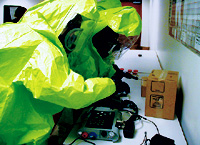 |
| AT THE TOP Longtime CEO Hwang (left) and president likely heir Jaska push business agenda. (Photo courtesy of Tetra Tech Inc.) |
The young immigrant who came from a Chinese village 300 miles south of Shanghai has done well for himself in America. The engineering firm he has shepherded since 1988 is now a billion-dollar-plus entity with 8,000 people. And the onetime lowest-paid employee at Tetra Tech Inc. pocketed $334,000 in salary last year, not counting other compensation.
More than 40 years after Li-San Hwang left the Far East with $100 in his pocket for a civil engineering degree from Michigan State Universitythe school offered him the biggest scholarshipmoney is no longer as much of a worry for the chairman and CEO of Tetra Tech Inc.
The Pasadena, Calif.-based environmental firm, turning now to security, telecommunications and building construction as well, posted $1.1 billion in gross revenue in 2002 and could reach $1.3 billion by years end. Since going public in 1991, Tetra Tech has acquired its way to the top in its key market, water resources management, as well as in other emerging fields (see chart). "Were not buying furniture with these acquisitions," says Hwang. "We want to take advantage of why they are here." For such an acquisition-hungry company, it has managed to keep debt surprisingly low, at just $100 million.
|
For its most recent quarter ended March 30, the firm beat Wall Street estimates both on earnings per share, 21� vs. 20�, and operating margins, 11.1% vs. 10.4%. This has come despite continuing financial repercussions from earlier soured ventures.
To many inside and outside Tetra Tech, the companys diminutive and still heavily accented CEO is the secret of its success. Paul Zofnass, president of New York City management firm Environmental Financial Consulting Group, who makes a sport out of listing terminated engineering firm CEOs at his annual conferences, says Hwangs longevity is extraordinary. "You cant always understand what he is saying, but hes brilliant and his performance speaks for itself," he says.
Hwang joined Tetra Tech in 1967 as a freshly minted Ph.D. civil engineer from the California Institute of Technology. "I was the firms ninth employee and the lowest paid," he says. His early specialization in water-related niches continued even as the firm expanded into other environmental areas and he moved up the management ranks.
In 1983, Tetra Tech was bought by Honeywell Corp., which was then seeking to diversify and make use of the engineers growing expertise in underwater monitoring and modeling, among other service skills. But the new parent grew wary of its subsidiarys risky hazardous waste work and sought to spin it off five years later. There were no takers so Hwang enlisted employees and venture capitalists to buy back Tetra Tech for $13 million. The firm then took advantage of a growing stock market to go public in 1991. "In our first 10 years, we were growing at 35% a year,"
says Hwang.  Click here to view chart
Click here to view chart
While the Honeywell association was short, it forged a link between Hwang and James M. Jaska, a former executive who was persuaded to join Tetra Tech in 1994 and became president in 2001. "What I saw about Li-San and Tetra Tech is what I called a restless spirit," says Jaska. "Most engineers build things that resist change, including businesses. At Tetra Tech, things are changing by design."
Since its early days, Tetra Tech has focused on perfecting and expanding its water services market. As a major consultant to the U.S. Environmental Protection Agency, the firm claims it "wrote the book" on developing regulations and compliance guidance for states in meeting Total Maximum Daily Load (TMDL) requirements for polluted water bodies. Last year, the firm was awarded a $93-million EPA contract to continue the effort in watersheds for the next five years. Its Website is peppered with announcements of water resource consulting and engineering contracts for federal, municipal and private clients. The water business makes up nearly 55% of revenue and will remain a mainstay. "Water will continue to grow for a long, long time," says Hwang.
Even so, Tetra Tech has also sought to push growth, financial reward and client demand for more services by diversifying into other environmental arenas. The firm already has $15 million of task orders for hazardous waste services for the U.S. Air Force under a a 2002 contract. A post- 9/11 call from EPA, in the wake of the anthrax scare, has catapulted a move into security work. Tetra Tech won a $15-million, three-year Army Corps of Engineers contract last year to handle homeland defense and security work for infrastructure in four Midwest states. The firm claims this was the first such contract of its kind. It is also part of a team led by Perini Corp., Framingham, Mass., that won a Corps contracts for Iraq emergency work.
Acquisitions also propelled Tetra Tech into nonenvironmental areas. The 1999 purchase of Cosentini Associates, New York City, opened new markets in the Northeast and in commercial construction. Cosentini is handling mechanical and electrical engineering as well as information technology work for AOL Time Warners new $2.5-billion Manhattan headquarters. Buying Ithaca, N.Y.-based Thomas Group launches a new niche in school design.
 |
 |
 |
| DIVERSE Acquisitions have pushed Tetra Tech into high-tech building work (top), school design (center) and security consulting. (Photos courtesy of Tetra Tech Inc.) |
But not all diversification moves have worked out. Tetra Tech jumped headlong into the once-booming telecommunications market in 1999 and is still paying the price for not recognizing the danger signs of that now- imploded market.
The firm sustained losses as clients cancelled work or went bankrupt, forcing it to take writeoffs and reduce revenue in that sector. That business once made up 28% of revenue at its peak. "We were slow to leave, and we were criticized for it," says Hwang. Observers note that Tetra Tech was trading at about $30 per share three years ago. Now it is $16. "The gamble on telecom was not disastrous, but painful," says Zofnass. "It took the bloom off the rose."
But Tetra Tech says there are signs of a telecom rebound. In late April, it was awarded a $45-million contract from Nextel to design and manage construction of 540 western region wireless cell sites. Tetra Tech executives and analysts are optimistic the market will recover. "If water is essential to life, telecommunication is essential to future development," says Hwang.
That Tetra Techs market-by-acquisition binge has worked is a testament to its leaders push for entrepreneurship. While other consolidators quickly blend their purchases and force-feed one identity, Tetra Tech remains a confederation of different unit names, logos and cultures that can take years to change.
"Maybe you can save a lot of money by integrating, but we dont believe thats a good idea," says Hwang. Acquired executives agree. "They leave you in peace. Im not being micromanaged in any way," says Anwar E.Z. Wissa, president of Ardaman & Associates Inc., a mid-sized Orlando-based environmental and geotechnical engineer acquired in July 2002. Jaska says Tetra Tech is far from a jumbled mess. "Some say we have no culture, but itsmade of all these operating units," he says. "Its one of focused independence and its very powerful."
Others say that the marriages can be rocky at first. The Cosentini acquisition was an eye-opener for a Southern California firm not used to the tough ways of New Yorks commercial construction market. "It took them a while to understand the culture of New York, the salaries and cost structure," says Cosentini Chairman Marvin Mass. Moving from the privacy of a partnership to the glare of public ownership can make for a difficult adjustment. But Jaska says it makes engineers into better businesspeople. "We learn what the critics think each quarter," he says. "You dont wait for the once-a-year audit."
Tetra Techs culture-fit experiment will be tested in a big way as it digests Foster Wheeler Environmental Corp., the waste cleanup unit of the financially ailing power contractor that was acquired in March for $80 million. The acquisition is by far Tetra Techs largest to date. It accounts for $10 million of the $15-million jump in its second-quarter revenue, compared to 2002. FWE is a big player in Defense Dept. and Energy Dept. circles, including managing cleanup at the Armys Rocky Mountain Arsenal in Denver. The purchase dramatically shifts Tetra Tech into the federal government market, with up to 40% of revenue this year to be gained there.
Tetra Tech snared the unit in a whirlwind five-week deal that followed the failure of another would-be purchase by a nonenvironmental investor group that officials decline to identify. FWE couldnt be happier. "They clearly understood the metrics of our business," says FWE President Sam W. Box. And whatever discomfort may exist in this new fit is balanced by FWEs relief in being separated from its Bermuda-incorporated former parent. Following the Sept. 11, 2001, attacks and the rise in U.S. patriotism, offshore ownership "was not seen as a good thing by government clients," says one FWE executive. The rumblings even escalated into potential anti-offshore legislation in Congress. Box says the firm did not lose work or awards as a result, but "it was a potential detriment." FWE executives say they are already benefiting. "Its given us a lot more clout in the marketplace," says one. "Were doing joint proposals."
While backlog is now nearly $1 billion, softening markets will make business more challenging going forward. The firm recently hired a new chief financial officer who once managed Pacific region finances for Bechtel Group Inc. and has added outside board members to meet the governments push on better governance. These include Richard Truly, a retired U.S. Navy admiral and former space shuttle commander.
Some observers hint that Jaska, 52, will soon succeed Hwang. The 67-year-old chairman, the firms third-largest shareholder with a 3.4% stake, down from 7.9% in 1996, has not elaborated on his retirement plans. While there are rumors of a potential retirement home now under construction, Jaska says Hwang likes to remind people that onetime Chinese leader Mao Zedong "didnt start leading until he was 74."

Post a comment to this article
Report Abusive Comment